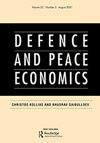导弹测试数据集介绍
IF 1.6
3区 经济学
Q2 ECONOMICS
引用次数: 1
摘要
摘要本文介绍了导弹试验数据集,该数据集由1946年至2015年间启动导弹开发计划的15个国家进行的公开和未公开的导弹试验组成。然后,它从统计数据上探讨了影响这些国家试射导弹频率的因素。在这方面,调查了三种广泛的可能性:(一)在决定升级导弹库或导弹相关技术后增加导弹试验,(二)增加导弹试验以报复外国军事威胁,以及(三)由于制裁带来的经济成本而减少导弹试验。负二项回归分析表明,升级导弹和导弹相关技术的决定增加了所有导弹试验,但对公开的导弹试验没有一致的影响。令人惊讶的是,军事性质的威胁对所有或公开的导弹试验都没有持续的影响。然而,受到经济制裁的公开导弹试验增加。论文最后讨论了未来研究的可能性和政策建议。本文章由计算机程序翻译,如有差异,请以英文原文为准。
Introducing Missile Tests Dataset
ABSTRACT This paper introduces the Missile Tests Dataset which consists of the publicized and undisclosed missile tests conducted by 15 countries that initiated their missile development programs sometime between 1946 and 2015. Then it statistically explores factors that affect how frequently these countries test-launch their missiles. In that regard, three broad possibilities are investigated: (i) increases in missile tests following decisions to upgrade the missile arsenal or missile-dependent technologies, (ii) increases in missile tests as a retaliation to foreign military threats, and (iii) decreases in missile tests due to economic costs introduced by sanctions. Negative Binomial regression analyses suggest that decisions to upgrade missile and missile-dependent technologies increase all missile tests but have no consistent effect on publicized missile tests. Threats of military nature have surprisingly no consistent effect on all or publicized missile tests. However, receiving economic sanctions increase publicized missile tests. The paper concludes with a discussion of future research possibilities, and policy recommendations.
求助全文
通过发布文献求助,成功后即可免费获取论文全文。
去求助
来源期刊

Defence and Peace Economics
ECONOMICS-
CiteScore
4.00
自引率
18.80%
发文量
45
期刊介绍:
Defence and Peace Economics embraces all aspects of the economics of defence, disarmament, conversion and peace. Examples include the study of alliances and burden-sharing; military spending in developed and developing nations; arms races; terrorism; country surveys; the impact of disarmament on employment and unemployment; the prospects for conversion and the role of public policy in assisting the transition; the costs and benefits of arms control regimes; the arms trade; economic sanctions; the role of the United Nations.
 求助内容:
求助内容: 应助结果提醒方式:
应助结果提醒方式:


